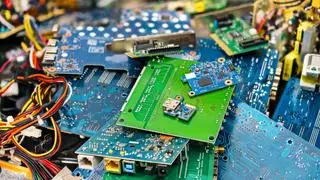“I want to measure success with (environmental) impact,” says Annanya Agarwal, Co-founder and CEO of Runaya Refining, who wears his passion for sustainable practices on his sleeve.
One among a handful of players looking at recovery of waste generated from metals, Annanya and his brother Naivedya are the sons of Navin Agarwal, bother of Vedanta chairman Anil Agarwal. They thus have the metals business running in their veins. With a love for the environment since childhood, when the brothers conceived of start-up Runaya in 2017, what excited them was the opportunity to recover, as much as possible, the waste generated during metals manufacturing so that minimal industrial waste reached the landfills.
Runaya started its journey with aluminium and zeroed in on a licensed proprietary patented aluminium dross processing technology that is based on zero waste and zero discharge. Dross is a waste product that gets produced during aluminium smelting, “like malai on a cup of tea”, as Annanya puts it, and generates waste that ends up in landfills.
Runaya is currently using the dross processing technology at Vedanta Aluminium’s smelter facility in Jharsuguda, Odisha. Dross processing has enabled Vedanta to offer an ultra-low carbon product line called ‘Restora Ultra’.
Adding value
Dross technology also helps create a value-added product for the steel industry — the Runaya Briquettes. This Alumina-based steel slag conditioner improves the cost economics of steel production while enhancing the quality of steel. “It sucks the oxygen and sulphur out of the steel and increases its purity,” explains Annanya. Runaya plans to produce 24,000 tonnes of briquettes by FY 23.
But much needs to change in the manufacture of aluminium. Annanya points out that traditionally aluminium is made using the worst methods possible worldwide. On an average about 11 tonnes of carbon is generated to produce a tonne of aluminium. Even the good companies that still use thermal power to manufacture aluminium produce around eight tonnes of carbon for every tonne of aluminium manufactured and their product is classified as green aluminium. However, Annanya feels the carbon can be cut to four tons for every ton of aluminium processed. And companies that are making the switch towards complete or partial renewable energy will be able to do so.
Plans ahead
Though Runaya currently works in Vedanta facilities, the plans ahead are ambitious and involve consulting with others as well and recovering waste from all metals. In fact, the start-up is setting up a minor metal recovery complex for Hindustan Zinc in Dariba and Chanderia to recover metals such as cadmium, copper dross, copper matte, among others which are found in the mining chain of zinc, copper and silver.
Annanya’s focus on recovery from industrial waste has made him spend the last six months taking a deep dive into zinc. He is currently acquiring technologies to clean up this stream. He is steadfast in the belief that sustainability can be a profitable business.








Comments
Comments have to be in English, and in full sentences. They cannot be abusive or personal. Please abide by our community guidelines for posting your comments.
We have migrated to a new commenting platform. If you are already a registered user of TheHindu Businessline and logged in, you may continue to engage with our articles. If you do not have an account please register and login to post comments. Users can access their older comments by logging into their accounts on Vuukle.